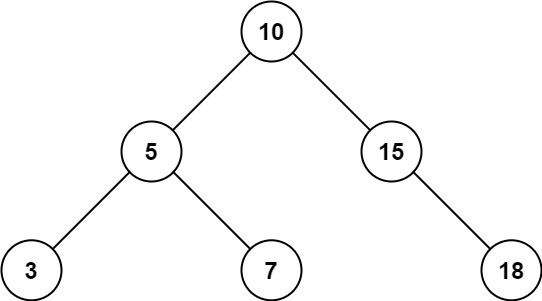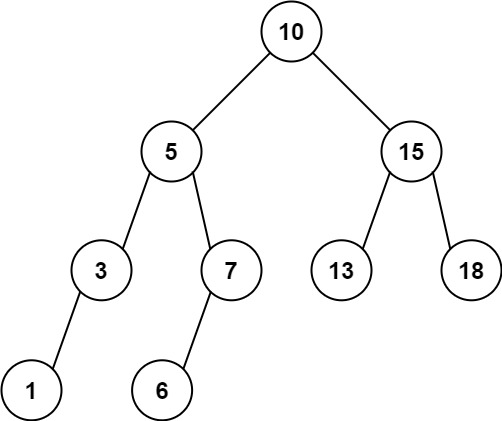上次编辑到这里,代码来自缓存 点击恢复默认模板
/**
* Definition for a binary tree node.
* struct TreeNode {
* int val;
* TreeNode *left;
* TreeNode *right;
* TreeNode() : val(0), left(nullptr), right(nullptr) {}
* TreeNode(int x) : val(x), left(nullptr), right(nullptr) {}
* TreeNode(int x, TreeNode *left, TreeNode *right) : val(x), left(left), right(right) {}
* };
*/
class Solution {
public:
int rangeSumBST(TreeNode* root, int low, int high) {
}
};
java 解法, 执行用时: 0 ms, 内存消耗: 49.9 MB, 提交时间: 2024-02-26 09:54:54
/**
* Definition for a binary tree node.
* public class TreeNode {
* int val;
* TreeNode left;
* TreeNode right;
* TreeNode() {}
* TreeNode(int val) { this.val = val; }
* TreeNode(int val, TreeNode left, TreeNode right) {
* this.val = val;
* this.left = left;
* this.right = right;
* }
* }
*/
class Solution {
public int rangeSumBST(TreeNode root, int low, int high) {
if ( root == null ) return 0;
if ( root.val > high )
return this.rangeSumBST(root.left, low, high);
if ( root.val < low )
return this.rangeSumBST(root.right, low, high);
return root.val + this.rangeSumBST(root.left, low, high) + this.rangeSumBST(root.right, low, high);
}
}
python3 解法, 执行用时: 120 ms, 内存消耗: 24.3 MB, 提交时间: 2024-02-26 09:50:13
# Definition for a binary tree node.
# class TreeNode:
# def __init__(self, val=0, left=None, right=None):
# self.val = val
# self.left = left
# self.right = right
class Solution:
def rangeSumBST(self, root: Optional[TreeNode], low: int, high: int) -> int:
ans = 0
stack = [root]
while stack:
node = stack.pop(0)
if node == None: continue
if node.val > high:
stack.append(node.left)
elif node.val < low:
stack.append(node.right)
else:
ans += node.val
stack.append(node.left)
stack.append(node.right)
return ans
python3 解法, 执行用时: 102 ms, 内存消耗: 24.1 MB, 提交时间: 2024-02-26 09:45:33
# Definition for a binary tree node.
# class TreeNode:
# def __init__(self, val=0, left=None, right=None):
# self.val = val
# self.left = left
# self.right = right
class Solution:
def rangeSumBST(self, root: Optional[TreeNode], low: int, high: int) -> int:
if root == None: return 0
if root.val > high:
return self.rangeSumBST(root.left, low, high)
if root.val < low:
return self.rangeSumBST(root.right, low, high)
return root.val + self.rangeSumBST(root.left, low, high) + self.rangeSumBST(root.right, low, high)
golang 解法, 执行用时: 124 ms, 内存消耗: 9.2 MB, 提交时间: 2021-06-04 15:09:36
/**
* Definition for a binary tree node.
* type TreeNode struct {
* Val int
* Left *TreeNode
* Right *TreeNode
* }
*/
func rangeSumBST(root *TreeNode, low int, high int) int {
if root == nil {
return 0
}
if root.Val > high {
return rangeSumBST(root.Left, low, high)
}
if root.Val < low {
return rangeSumBST(root.Right, low, high)
}
return root.Val + rangeSumBST(root.Left, low, high) + rangeSumBST(root.Right, low, high)
}
golang 解法, 执行用时: 108 ms, 内存消耗: 9 MB, 提交时间: 2021-06-04 15:05:05
/**
* Definition for a binary tree node.
* type TreeNode struct {
* Val int
* Left *TreeNode
* Right *TreeNode
* }
*/
func rangeSumBST(root *TreeNode, low int, high int) int {
ans := 0
stack := []*TreeNode{root}
for len(stack) > 0 {
node := stack[0]
stack = stack[1:]
if node == nil {
continue
}
if node.Val > high {
stack = append(stack, node.Left)
} else if node.Val < low {
stack = append(stack, node.Right)
} else {
ans += node.Val
stack = append(stack, node.Left, node.Right)
}
}
return ans
}

